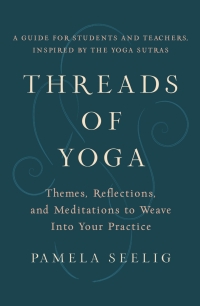What If I Don’t Feel Thankful?

Yoga philosophy teaches that contentment, or Santosha in Sanskrit, is an empowering and potent practice. This was news to me. I thought that contentment was a pleasant feeling that arose due to outer circumstances, such as feeling warm and dry when it’s cold outside.
Finding The Guide Within

The case for meditating has become so strong that the question should now be, “why aren’t we all meditating?” We know that it reduces stress, increases immunity, increases overall well-being, slows the aging process, reduces anxiety and depression, and the list goes on. However, even knowing this, we may still welcome a more personal motivation to sit on our cushion.
One such motivation may be the desire to tap into our inner guidance. At some point, we all need help and support. Even the most independent among us, after exhausting all external options, eventually turn inward for answers. Seeking help within can provide astonishing revelations or just reinforce good common sense.
Is It Morning Yet?
Is it just me, or does it feel like morning? While some have had a much harder night than others, I’m hopeful that this groggy sense of waking up signals a genuine shift. The world has changed. I guess it always changes, but not at the speed of 2020. It was a lot, and the reverberations are continuing.
We witnessed firsthand the truth that we are all connected, a fact that the coronavirus exploited with deadly speed. The virus may have appreciated our oneness, but it seems that we became even more divided in many ways. Fear can do that.
Letting Go Is Hard To Do

Letting go may, at first, be unappealing and feel like quitting or giving up. Instead, we typically try to “hang on” or “hang in there,” cultivating grit and determination. Such traits provide a sense of control, even if control is often just a comforting illusion.
Sometimes, like a leaf in autumn hanging onto a branch for dear life, we may need to let go of whatever we’re clutching, stop our struggling, and trust in the natural flow of life.
As humans, we tend to avoid change. The status quo is predictable and comfortable. The pandemic has forced us all to let go of our old life in some form and accept the “new abnormal.” While some are suffering more than others, we all have had to ”practice” letting go of our future plans and accept the situation.
Yoga In The World

The pandemic has affected us all in different ways, but for most, it has slowed things down and starkly revealed humanity’s interconnectedness. Despite modern medicine, we are reminded of our vulnerability as the death toll rises.
Against this shaky backdrop, we witnessed the slow, torturous murder of George Floyd. That act, preceded by an unrelenting procession of black Americans killed or brutalized by the police, broke something in mainstream America. A pillar that holds up the image of our equal and just society buckled and exposed those who are clearly not supported by these ideals.
Be More You In 2020!

What if this year you don’t try to change anything, but instead resolve to bring more “You” into the world? Wait, don’t stop reading! Let me explain.
If You Can’t Meditate, Read This

Gratefulness: A New Twist

In Search Of Your True Nature
Often I begin class with a centering meditation and a reminder that, according to the ancient Yoga Sutras,
-Yoga is the quieting of the mind (book 1, sutra 2)
-Then the seer abides in her true nature (book 1, sutra 3)
One student in class today asked (rather loudly :), “What’s that? What’s our true nature?” Well, that’s a fundamental and beautiful question for which the only answer I know is; “practice yoga and experience it for yourself.” That is the purpose of yoga - to abide in our true nature and experience who we truly are. Deep,
How To Declutter The Mind
Declutter Your Mental Space
A friend of mine is exceptional at organizing her home, a trait that, let’s say, I’m still working on. Every once in a while I’ll ask what she’s up to and she’ll reply with purpose, “I’m taking my closets back.” When she puts it like that, I’m inspired to go home and conquer my closets or the pile of mail or whatever it is that has inevitably taken over.
This messy build-up also happens in the mind. If we’re unaware of the thoughts repeating in our head, a mess of useless chatter builds and blocks out our sense of peace and spaciousness. The mind unchecked can feel like anxiety, a sense of overwhelm, exhaustion or a lack of vitality. As the ancient yogis taught: the mind unsupervised is like leaving a monkey or a toddler in charge - it will be messy.
The best way to...
Why Meditate? The Answer Is A Secret.
There is so much evidence out there affirming the benefits of meditation that it’s almost annoying. Science has determined that meditation lowers blood pressure, strengthens immunity, reduces anxiety, etc, etc. Those are true side effects, but physical benefits are not why ancient yogis lived in caves for years or why spiritual masters spent solitary time in the desert. Meditators know this.
The real reason why we meditate is a secret. It’s an open secret, but still a secret to most. Many philosophers, sages and regular people have eloquently described their meditation experiences. However, what happens during meditation cannot be described with language. Meditation is the letting go of the mind. Words don’t work when you travel beyond the mind. As the ancient sacred Indian text, the Upanishads, state, “words turn back frightened,” when trying to describe truth. Without understanding the principal effects of meditation, one must take a leap of faith when beginning a practice.
Lesson Plan: Contentment
Let's Get Deep
What’s the difference between a good yoga class and a truly enlightening yoga experience?
When practicing yoga, even when focusing solely on the physical poses, there exists an inextricable link between the mind and body. The mind must be involved for the body to relax into a challenging pose. It’s impossible to stay focused on a worry if you are attempting to relax your shoulders. It won’t work. Relaxation occurs when the mind redirects from the worry and focuses on (perhaps) an exhale, and only then can the yogi experience a release in the shoulders. Even within the purely physical component of yoga, there exists an inherent mind/body link. Experiencing this link is the extent of the depth of most modern yoga classes today.
Why Risk Getting Deep With Your Yoga Class?
Introducing a theme such as "surrender" or "opening the heart" can create a beautiful and expansive class experience. However, you may feel resistance from students as many yogis, especially beginners, come to class for the workout and have no interest in yoga wisdom or introspection. Weaving yogic insights throughout class without sounding cheesy or, even worse, preachy is also not easy to do. As teachers, we may question whether or not to take the time and risk diving deeper into philosophy. But sharing this information is crucial, and probably the reason you became a yoga teacher.

